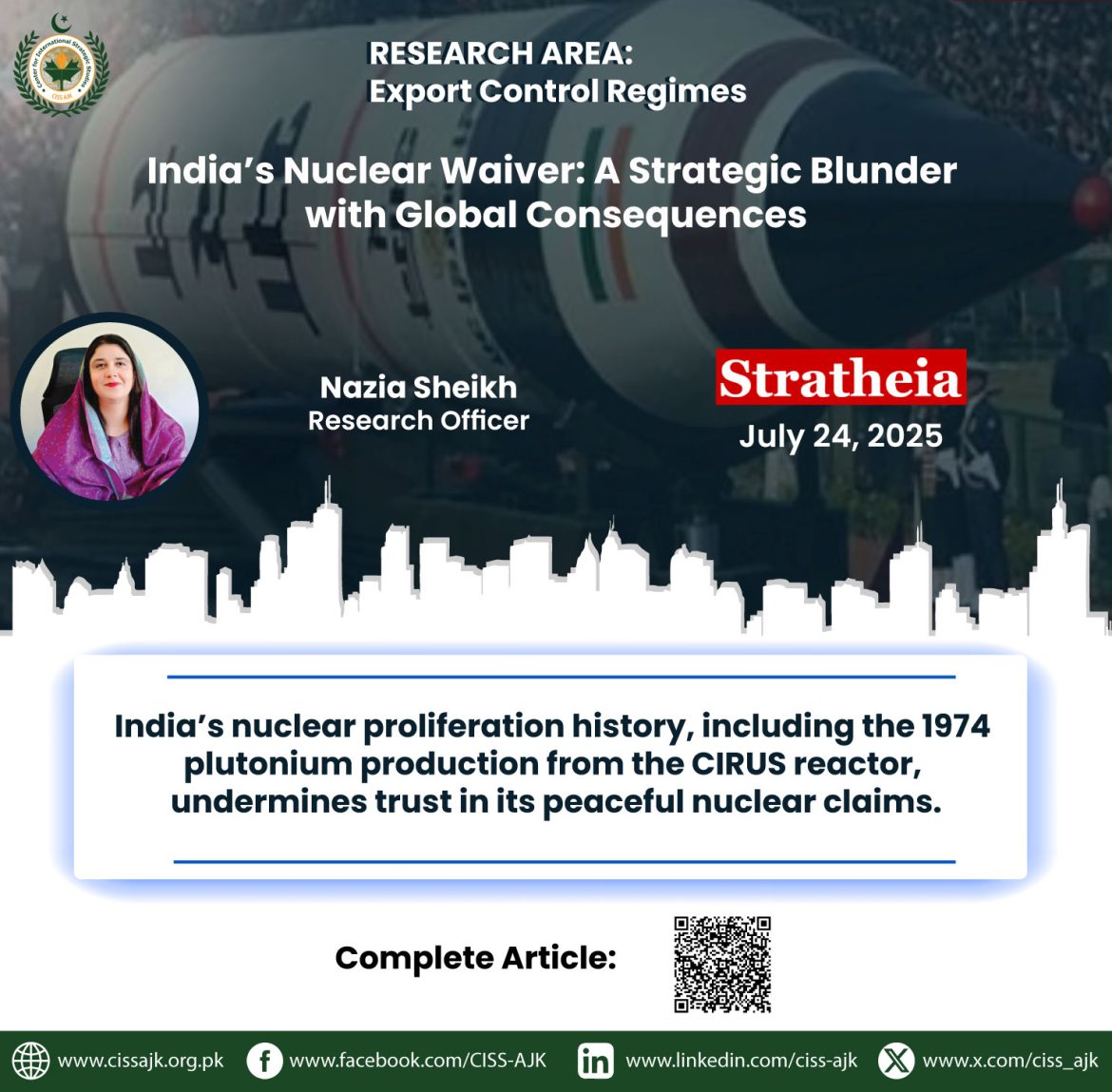India has a history of utilizing dual-purpose technologies to achieve its national security objectives. India’s misuse of the CIRUS reactor donated by Canada to produce Plutonium for peaceful purposes in 1974 is a case in point of how India had blurred the lines between peaceful and military use of nuclear technology in the Past. In response to the violations of such pledges that civilian nuclear technology will not be used for military objectives, the US and along with other concerned nations, created the Nuclear Suppliers Group (NSG). This global initiative was aimed at providing robust scrutiny over nuclear trade and to prevent such violations in the future.
India’s misuse of civilian nuclear tech like the CIRUS reactor blurred peaceful and military uses, triggering NSG creation.
However, in May 2016, India formally applied for NSG membership, despite its controversial proliferation record. The U.S granted an NSG waiver to India in 2008 and firmly supported its NSG membership. India, after this waiver, has been able to sign agreements for civil nuclear cooperation with more than 16 nations. However, India has yet to execute its 2008 commitments, which include working with the United States to finalize the Fissile Material Cutoff Treaty (FMCT) and identifying and separating military and civil nuclear sites.
In this context, the strategic blunder of granting a waiver to a non-NPT signatory state heightened arms race, will have detrimental effects on international security in two ways. Firstly, it has damaged the credibility of the global non-proliferation regime and established a concerning precedent that will affect the international security dynamics in the end. Such concessions based on geopolitical interests raise questions on the credibility of multilateral frameworks. Their legitimacy is being undermined, which could encourage other governments to pursue similar preferential treatment.
The NPT, which is the foundation to stop the spread of nuclear weapons, also suffered a significant blow from the waiver. In exchange for peaceful nuclear cooperation, non-nuclear weapon states for decades refrained from developing nuclear weapons and accepted NPT safeguards. Undermining the NPT’s core foundation allows India, a non-signatory that conducted nuclear weapons testing outside of this framework, the same privileges without corresponding obligations. It served as a warning that treaty obligations could be superseded by geopolitical favoritism, fostering animosity and undermining international non-proliferation standards.
The 2008 US-backed NSG waiver for India weakened the NPT by granting non-signatory privileges without obligations.
Additionally, India’s membership in the NSG will have a detrimental effect on nuclear security worldwide. The waiver violates all established norms about nuclear proliferation, as does the attempt to get India to join the NSG exclusively. The United States is merely backing India for strategic purposes, views India as a regional counterbalance to China. In light of these developments, Pakistan is concerned that India’s membership in the NSG may increase its access to nuclear technologies to deter Pakistan potentially affecting the balance of power in the region.
The waiver has accelerated India’s strategic build-up by allowing it to access international nuclear markets as a non-NPT state, freeing up its domestic fissile material for weapons purposes. The arms race has intensified as a result of Pakistan being forced to strengthen its deterrent to re-establish regional equilibrium. India is also currently modernizing its nuclear arsenal; lapses in its nuclear safety and security, and a special waiver of NSG have bolstered the arms competition and created geopolitical instability in the region by assisting India in developing its offensive weaponry.
Secondly, it will further encourage India to continue using nuclear technology for military purposes. India is already modernizing its nuclear arsenal according to the Stockholm International Peace Research Institute (SIPRI) 2025 report, increasing from 172 to 180 in 2025. By gaining access to international nuclear markets, it enables India, to safeguard uranium and cutting-edge technologies while maintaining its substantial nuclear arsenal.
Consequently, India may gain a strategic advantage over Pakistan, enabling it to promote its ambitious thorium-based program. As seen by its training of Sri Lankan experts and possible reactor exports to Bangladesh, the waiver benefits India economically by allowing it to commercialize nuclear power technology, increasing both its reputation and revenue. As an NSG member, India also gains the power to influence future additions, preventing Pakistan from joining and solidifying its dominance in the region.
India’s NSG membership may escalate regional instability by enhancing its nuclear arsenal and barring Pakistan’s inclusion.
In line with India’s goal of reducing dependence on fossil fuels under the broader aim of clean energy, these developments also help the country reach its target of 40% nuclear, solar, and wind power. Furthermore, rather than naively endorsing India’s bid for NSG membership, proponents of giving India such a favor should have taken into account India’s track record of proliferation, as India has a history of uranium theft incidents, raising concerns regarding the safety and security of nuclear infrastructure.
Aside from escalating an arms race and causing instability to the geopolitical landscape of South Asia, establishing a nation-specific exception for NSG membership would hurt global non-proliferation initiatives. Non-proliferation goals should not be subordinated to political expediency or commercial considerations; rather, the NSG should evaluate non-NPT governments’ membership based on objective, non-discriminatory standards.
Non-discriminatory, objective criteria must guide NSG membership to preserve global non-proliferation integrity.
The heightened great power competition, limited wars, regional conflicts, and rapid advancements in nuclear and missile technology pointed towards horizontal nuclear escalation in the future. To prevent nuclear proliferation, there is a pressing need for strong, widely accepted non-proliferation regulations based on an equal and non-discriminatory approach.
Disclaimer: The opinions expressed in this article are solely those of the author. They do not represent the views, beliefs, or policies of the Stratheia.



